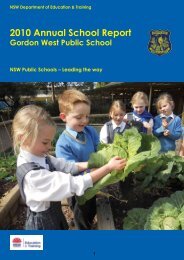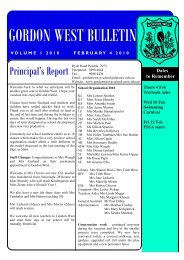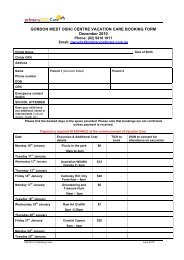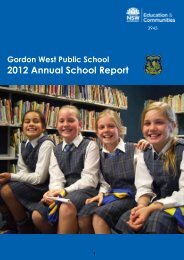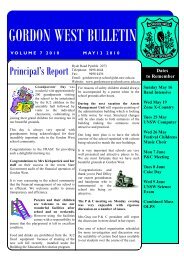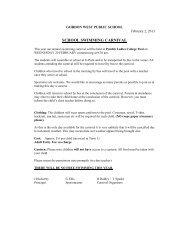2011 Annual School Report - Gordon West Public School
2011 Annual School Report - Gordon West Public School
2011 Annual School Report - Gordon West Public School
You also want an ePaper? Increase the reach of your titles
YUMPU automatically turns print PDFs into web optimized ePapers that Google loves.
KEY EVALUATIONS<br />
It is a requirement for all NSW public schools to conduct at<br />
least two annual evaluations – one related to educational and<br />
management practice and the other related to curriculum. The<br />
school has adopted a cyclical approach to the evaluation of the<br />
six areas of education and management practices to ensure<br />
that it operates at a highly efficient level.<br />
Educational and Management<br />
Practice<br />
Culture<br />
Background<br />
Enhancing the quality of the school’s management practices<br />
and improving the learning outcomes of all students are key<br />
educational objectives.<br />
The survey tool <strong>School</strong>Map, developed by the Department of<br />
Education and Training (DET) was used to collect information.<br />
The primary purpose of the <strong>School</strong>Map best practice statements<br />
is to provide a framework for analysis of the operation<br />
of schools in six key areas. The statements are based on the<br />
findings of research and the views of a wide cross section of<br />
teachers, parents and students about current practices and<br />
potential best practice in schools.<br />
<strong>School</strong>Map best practice statements were used to evaluate<br />
school management at <strong>Gordon</strong> <strong>West</strong> with regard to school improvement<br />
performance, major and minor changes to school<br />
programs, monitoring and evaluation of programs, student and<br />
staff welfare, teacher professional development, school organisation,<br />
financial management and communication.<br />
Responses were collated under strongly agree, agree, neutral,<br />
disagree and strongly disagree.<br />
The <strong>School</strong>Map evaluation instrument was used to evaluate<br />
whether:<br />
1. The school is continually looking at ways to improve its performance.<br />
2. The school continually makes minor changes to its programs<br />
to improve what it does.<br />
3. The school makes major changes from time to time to improve<br />
what it does.<br />
4. The school regularly measures the success of its programs.<br />
5. The educational needs of all students are met by the school.<br />
6. The school care about the students and the discipline is fair.<br />
7. The staff at the school are valued and supported.<br />
8. Teachers undertake extra training to improve their classroom<br />
teaching.<br />
9. The school is well organised.<br />
10. The allocation of money and other resources is managed<br />
effectively.<br />
Findings and Conclusions<br />
Staff<br />
The school set preliminary targets before administering the<br />
tests. The school expectation was that at least 80% of teachers<br />
would respond ‘Strongly Agree’ or ‘Agree’ to the statements<br />
in the area of <strong>School</strong> Management.<br />
The staff response to the best practice statements was over<br />
80% for eight of the ten statements with responses to Question<br />
3 and 8 at 75%. These statements related to major change<br />
(Question 3) and systematically planned professional development<br />
(Question 8).<br />
Parents<br />
A total of 89 parents responded to the <strong>School</strong>Map best practice<br />
survey. Parent responses were very positive. Responses<br />
of strongly agree/agree were selected for 8 of the 10 statements<br />
with each of these receiving over 80% combined. The 2<br />
statements which rated less positively were “The educational<br />
needs of all students are met by the school” (56%) and “The<br />
school makes major changes from time to time to improve<br />
what it does.” (57%)<br />
Some parents surveyed believe the school could further improve<br />
in the area of meeting the needs of all students. Currently<br />
the school employs a specialist learning support teacher<br />
and three learning support teachers’ aides to work closely with<br />
our students who require additional assistance. The $30,000<br />
received annually from the <strong>Gordon</strong> <strong>West</strong> Parents and Citizens<br />
in addition to a similar amount funded by the school makes<br />
the Learning Support program the most financially resourced<br />
of all the school programs. Currently this additional learning<br />
support focuses on improving student literacy skills. With the<br />
need to maximise the use of these available funds, the school<br />
prioritises students who need support in literacy as developing<br />
a student’s reading comprehension skills is beneficial to progressing<br />
their proficiency in both literacy and numeracy.<br />
The school’s vision is “to be seen as a school of excellence,<br />
with a definite purpose and direction” and continues to excel<br />
academically, on the sporting field and in cultural pursuits. Our<br />
achievements are in part due to the strong, ongoing efficient<br />
and effective management of the school. While this stability<br />
and success creates little necessity to make major management<br />
changes, <strong>Gordon</strong> <strong>West</strong> is always looking at ways to improve<br />
and refine its existing organisational processes.<br />
Students<br />
A total of 120 students from Year 5 and 6 were surveyed.<br />
Overall the survey results indicated that the students at <strong>Gordon</strong><br />
<strong>West</strong> were generally positive to the school’s management<br />
practices. The responses relating to the allocation of finances,<br />
student welfare and major school change were statements<br />
scoring 60%. The remaining seven statement responses<br />
scored over 75%.<br />
Future Directions<br />
The evaluation of survey results identified certain areas for future<br />
development including the need for the school to:<br />
• Greater involvement by staff in the decision making and leadership<br />
roles.<br />
• Ensure all staff update their professional learning plans annually,<br />
and<br />
• Investigate implementing additional communication strategies<br />
and refining existing practices.<br />
19



